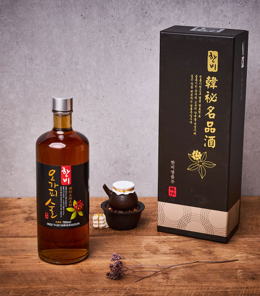
Jecheon-si, Chungcheongbuk-do, Korea South, 3rd Jul 2024 – “With utmost care and cultivation, we produce non-polluted ogaepi, crafting our liquor with dedication. The taste and aroma are always delightful, and the liquor is clean and refreshing, even beneficial for health.”
Goo Gyo-chang, the CEO of Anax Biopolis Korea (www.hanbisoju.com), has a deep affection for traditional liquor. With his flagship brand, ‘Hanbi,’ he is targeting not only the domestic market but also expanding his reach overseas.
The name ‘Hanbi’ combines ‘Han’ (韓), symbolizing Korea, and ‘Bi’ (秘), meaning secret, indicating that the liquor is crafted using secret methods passed down from Korean traditions.
In the scenic region of Jecheon, North Chungcheong Province, Goo leads an association that produces, processes, and sells excellent medicinal herbs grown organically. The ogaepi used to make his traditional liquor is the only one in Korea to receive the Good Agricultural Practices (GAP) certification.
“We create traditional liquor using ogaepi that hasn’t been exposed to pesticides. Additionally, by stably producing local specialties, we contribute to the income of farms and cooperatives, thus supporting the local economy.”
Goo’s interest in traditional liquor began in 2010. At the time, he was already cultivating ogaepi in Jecheon but decided to venture into the liquor business after much deliberation and encouragement from the city.
“If I were to start this, I wanted to do it right—make the best traditional liquor in Korea, a healthy liquor that anyone can enjoy, and a Korean liquor that can compete globally.”
This vision laid the groundwork for the birth of ‘Hanbi,’ a traditional liquor made with ogaepi.
“I made the right choice to start eco-friendly ogaepi farming. We use 100% domestically produced rice, filter it using a vacuum distillation system, and age the soju for over a year. We then finely chop the ogaepi roots, add them, and age it again for over a year. After 2-3 years, we have a delicious and healthy ogaepi liquor.”
Anax Biopolis Korea’s ogaepi liquor contains six times more effective ingredients than Chinese ogaepi.
Each time Goo brews liquor, he is amazed by the wise ingenuity of his ancestors, who enjoyed liquor and culture.

In Korean culture, alcohol often accompanies social gatherings. While excessive drinking can be harmful, moderate drinking can be an effective means of sharing affection among loved ones. Why not fill your glass with a traditional Korean liquor infused with beneficial herbs instead of whiskey or wine?
“Historically, Korean liquor was called medicinal wine. We carefully infuse the fragrant, pesticide-free ogaepi into liquor made from steamed rice, yeast, and water.”
Hanbi contains no additives, using only steamed rice and yeast, ensuring no hangover despite its high alcohol content.
Goo emphasizes that liquor is not just for drinking; it serves as a means of communication and represents Korean culture, comparable to whiskey or wine.
“I am constantly researching and developing to embody the spirit of our ancestors who maximized the use of natural products.”
Traditional liquor brewing might seem simple.
“Traditional liquor is made by fermenting rice with yeast. Clear filtering results in cheongju, cloudy filtering produces takju, adding water to dilute and increase volume makes makgeolli, and distilling it creates soju,” Goo explains.
He added, “The unique scents produced depending on the brewer’s skill and rice processing method are the greatest characteristics of our traditional liquor, and it can have aromas like wine or cognac.”
The main traditional liquors currently produced by Goo include Hanbi Soju, Hanbi Ogaepi Liquor, Uirim Soju, Uirim Ogaepi Liquor, Jecheon Ogaepi 100 Concentrate, and Cheondeungsan Bakdaljae Ogaepi Pills.
On the 25th, Hanbi and other representative products were showcased at the ‘Our Liquor Room’ traditional liquor specialty store in the main branch of Shinsegae Department Store, recognizing Hanbi’s excellence.
“There are many experts with decades of experience in brewing abroad, but Korea lacks the know-how and experience in traditional liquor making. I am willing to pass on all my knowledge to anyone sincerely wanting to learn about traditional liquor,” Goo said.
He is focused on not only preserving Korea’s traditional liquor Hanbi but also making it a representative Korean liquor that captivates the global palate through ongoing research and development.
“I believe we can create world-class brands from traditional liquor, comparable to whiskey or wine. I will do my best to nurture successors so that Hanbi becomes a representative product of Korea’s tradition.”
Finally, he added, “Even if our traditional liquor sells in small quantities, I will spend my remaining life ensuring that Hanbi Soju, with its authentic taste and aroma, proudly takes its place.”
Learn more at: https://www.ksool.kr/index.html
Address : 16-10 Bukbu-ro 5-gil, Bong-yang-eup, Jecheon-si, Chungcheongbuk-do, Republic of Korea
Media Contact
Organization: Anax Biopolis Korea
Contact Person: Chaekyung Yu
Website: https://www.ksool.kr/index.html
Email: Send Email
City: Jecheon-si
State: Chungcheongbuk-do
Country: Korea South
Release Id: 03072413814
The post Anax Biopolis Korea, Revolutionizing Traditional Korean Liquor for Global Palates appeared first on King NewsWire. It is provided by a third-party content provider. King Newswire makes no warranties or representations in connection with it.
Disclaimer: The views, suggestions, and opinions expressed here are the sole responsibility of the experts. No Current Hue journalist was involved in the writing and production of this article.
